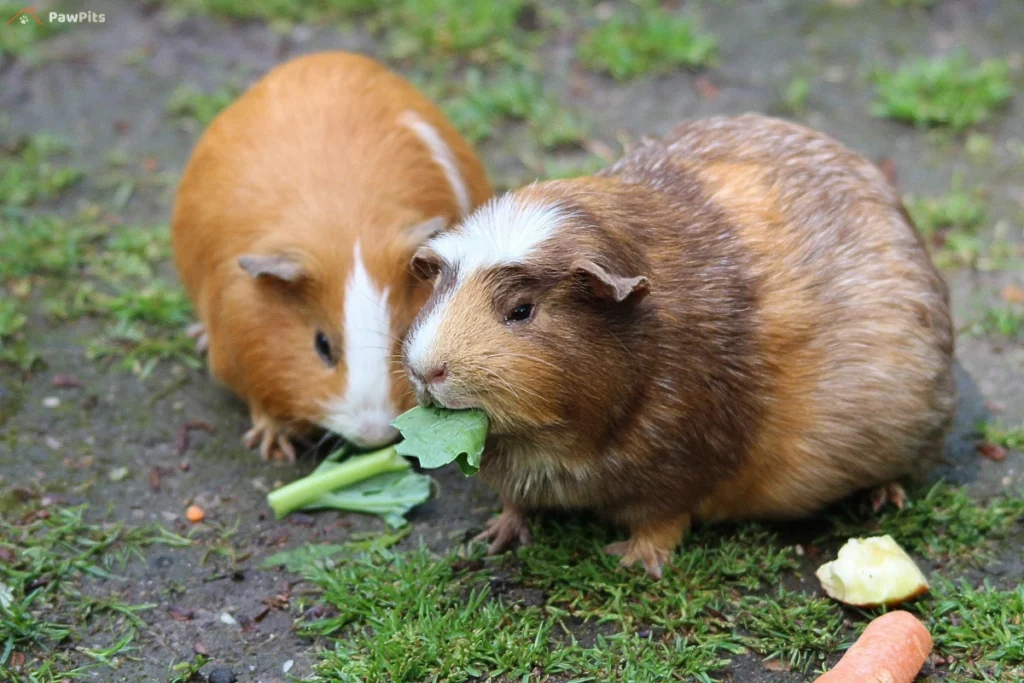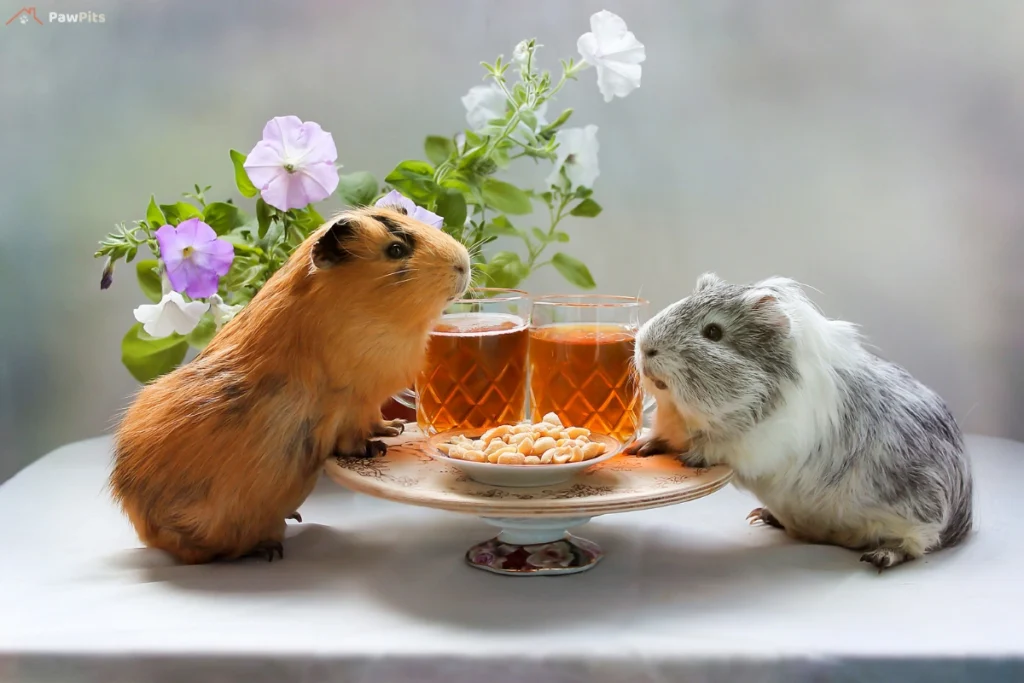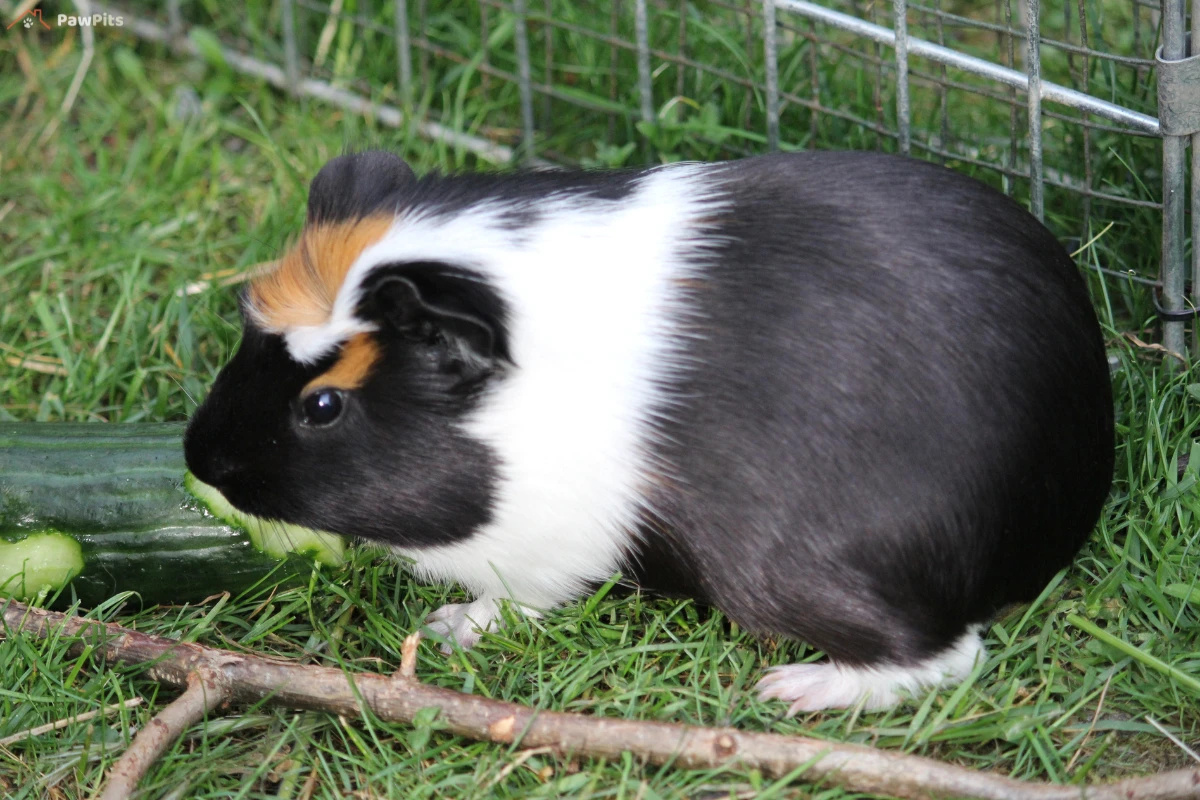Can guinea pigs have cucumbers? This is a common question among pet owners who want to provide a healthy diet for their furry friends. Cucumbers offer hydration, essential nutrients, and a refreshing snack, but they also come with potential risks. Feeding them in the right amount can benefit your guinea pig, while too much may cause digestive issues. Understanding the advantages and hidden dangers of cucumbers will help you make the best choice for your pet. This guide explores the benefits, risks, and safe feeding practices to keep your guinea pig healthy and happy.
Are Cucumbers Safe for Guinea Pigs?
Can Guinea Pigs Have Cucumbers Daily?
Guinea pigs can eat cucumbers, but offering them daily may not be the best choice. While cucumbers provide hydration and some essential nutrients, they lack the vitamins and minerals guinea pigs need for a balanced diet. Overfeeding cucumbers can also lead to digestive issues, such as bloating or diarrhea, due to their high water content.
Moderation Is Key
Cucumbers should be an occasional treat rather than a daily staple. Experts recommend feeding cucumbers two to three times per week in small portions. A slice or two per serving is enough to provide benefits without causing digestive discomfort.
Nutritional Limitations
Unlike leafy greens like kale or bell peppers, cucumbers have low vitamin C levels. Guinea pigs need vitamin C daily to prevent scurvy, a common health issue in small pets. Since cucumbers don’t offer enough of this essential nutrient, relying on them too often may result in a nutritional imbalance.
Balancing the Diet
A guinea pig’s diet should primarily consist of fresh hay, high-quality pellets, and vitamin C-rich vegetables. While cucumbers make a refreshing and low-calorie treat, they should complement other vegetables rather than replace them. Consider rotating cucumbers with nutrient-dense options like bell peppers, carrots, or romaine lettuce to ensure a well-rounded diet.
Feeding cucumbers in moderation keeps your guinea pig hydrated and happy while avoiding potential health risks. Always observe your pet’s reaction after introducing new foods and adjust portion sizes as needed.
Nutritional Value of Cucumbers for Guinea Pigs
Cucumbers are a hydrating and low-calorie snack, but their nutritional profile has both benefits and limitations. Understanding the key nutrients in cucumbers helps determine their role in a guinea pig’s diet.
1. High Water Content
Cucumbers contain about 95% water, making them an excellent source of hydration, especially in hot weather. Guinea pigs need constant access to fresh water, and cucumber can provide extra moisture to keep them refreshed. Eating too much can lead to stomach problems, like having diarrhea.
2. Low in Calories and Sugar
Cucumbers are naturally low in calories and sugar, making them a safe snack for guinea pigs prone to obesity. Unlike fruits, which can have high sugar content, cucumbers offer a guilt-free treat without the risk of weight gain or blood sugar spikes.
3. Contains Small Amounts of Essential Nutrients
While cucumbers are not a nutritional powerhouse, they do provide:
- Vitamin C (Minimal Amounts) – Essential for preventing scurvy, but cucumbers do not provide enough to meet daily needs.
- Vitamin K – Supports blood clotting and bone health.
- Potassium – Helps with muscle function and maintaining proper hydration.
- Fiber (Mostly in the Skin) – Aids digestion, but in small amounts compared to other vegetables.
4. Low in Essential Vitamins and Minerals
Guinea pigs require a diet rich in vitamin C, fiber, and calcium for proper growth and health. Cucumbers fall short in these areas, meaning they should not replace nutrient-dense vegetables like bell peppers, kale, or parsley.
Should You Feed Cucumbers for Nutrition?
Cucumbers offer hydration and a refreshing crunch, but they lack the essential nutrients guinea pigs need daily. While they make a great supplement to a well-balanced diet, they should be fed in moderation alongside other vegetables that provide higher amounts of vitamins and minerals.
How Much Cucumber Should a Guinea Pig Eat?
Guinea pigs can eat cucumbers, but portion control is essential to avoid digestive issues. While cucumbers provide hydration and a refreshing snack, feeding them in excess can lead to bloating or diarrhea.
Recommended Serving Size
A guinea pig should eat one to two thin slices of cucumber per serving, about two to three times per week. Each slice should be around ¼ inch thick, ensuring they get a treat without overloading on water content.
Feeding Frequency
- Occasional Treat – Cucumbers should not be a daily food but rather an occasional addition to their diet.
- 2-3 Times Per Week – This ensures they enjoy the benefits without experiencing digestive upset.
- Monitor for Reactions – If your guinea pig experiences diarrhea or bloating, reduce the amount or frequency.
Factors That Affect Portion Size
- Age and Size – Younger or smaller guinea pigs may need smaller portions than fully grown adults.
- Diet Balance – If your guinea pig eats other watery vegetables like lettuce or zucchini, limit cucumber intake to prevent excessive hydration.
- Health Conditions – Guinea pigs with sensitive digestion should have cucumber in even smaller amounts or less frequently.
How to Introduce Cucumbers to a Guinea Pig’s Diet
Start with a small piece and observe for any signs of digestive discomfort. If your guinea pig enjoys it and shows no adverse effects, continue offering cucumbers in moderation. Always combine them with other vitamin-rich vegetables like bell peppers or leafy greens to maintain a balanced diet.
3 Benefits of Feeding Cucumbers to Guinea Pigs

1. Hydration Boost
Cucumbers contain over 95% water, making them an excellent way to keep guinea pigs hydrated. Proper hydration is essential for maintaining healthy digestion, kidney function, and overall well-being. In hot weather, cucumbers can be a refreshing snack that helps prevent dehydration.
However, excessive water intake from cucumbers may lead to soft stools or diarrhea, so it’s important to feed them in moderation. Fresh water should always be available, and cucumbers should only serve as a supplemental source of hydration.
2. Low in Calories
Cucumbers are naturally low in calories and sugar, making them a great snack for guinea pigs prone to weight gain. Unlike high-sugar fruits or calorie-dense vegetables, cucumbers provide a light and refreshing treat without increasing the risk of obesity.
Since maintaining a healthy weight is important for guinea pigs, low-calorie snacks like cucumbers can be a beneficial addition to a well-balanced diet. Just be sure to pair them with nutrient-rich vegetables to ensure your pet gets essential vitamins and minerals.
3. Supports Digestion
Cucumbers contain a small amount of fiber, mainly found in the skin, which can aid in digestion. Fiber plays a crucial role in keeping a guinea pig’s digestive system functioning properly and preventing issues like constipation.
However, too much cucumber, especially if introduced too quickly, can cause bloating or loose stools due to its high water content. To avoid digestive discomfort, feed cucumbers in small portions and monitor your guinea pig’s reaction.
Adding cucumbers to a balanced diet with fiber-rich foods like hay and leafy greens will help promote healthy digestion without causing digestive upset.
2 Hidden Dangers of Cucumbers for Guinea Pigs
1. Oxalates & Bladder Stones
Cucumbers contain small amounts of oxalates, naturally occurring compounds that can contribute to bladder stone formation in guinea pigs. While cucumbers are not as high in oxalates as foods like spinach or parsley, excessive consumption can increase the risk, especially in guinea pigs prone to urinary issues.
Bladder stones form when oxalates bind with calcium, leading to painful conditions such as urinary tract infections (UTIs) or difficulty urinating. Guinea pigs require calcium for bone health, but too much combined with oxalates can be harmful.
How to Reduce the Risk:
- Feed cucumbers in moderation (2-3 times per week).
- Pair them with low-oxalate, high-vitamin C vegetables like bell peppers.
- Ensure your guinea pig drinks plenty of water to flush out excess minerals.
If your guinea pig has a history of bladder stones or UTIs, consult a vet before adding cucumbers to their diet.
2. Digestive Upset
Cucumbers have a high water content, which can sometimes cause diarrhea, bloating, or soft stools in guinea pigs. Their digestive systems rely on a balance of fiber and hydration, and too much watery food can disrupt this balance.
Signs of digestive upset include:
- Loose stools or diarrhea after eating cucumbers.
- Bloating or gas due to excess water intake.
- Reduced appetite or changes in behavior.
How to Prevent Digestive Issues:
- Start with small portions (one or two thin slices).
- Avoid feeding cucumbers daily stick to 2-3 times per week.
- Make sure your guinea pig eats plenty of hay, which supports gut health and prevents diarrhea.
If your guinea pig experiences persistent digestive problems, reduce cucumber intake or eliminate it from their diet. Always introduce new foods gradually to see how they affect your pet’s digestion.
How to Safely Feed Cucumbers to Guinea Pigs

Best Way to Prepare Cucumbers for Guinea Pigs
Proper preparation ensures that cucumbers are safe and healthy for your guinea pig. Follow these steps to serve cucumbers in the best way possible:
1. Choose Fresh, Organic Cucumbers
- Opt for organic cucumbers whenever possible to avoid pesticides and chemicals.
- Select fresh, firm cucumbers without soft spots or wrinkles.
2. Wash Thoroughly
- Rinse the cucumber under running water to remove dirt, pesticides, or residues.
- If non-organic, consider soaking in a vinegar-water solution (1 part vinegar to 3 parts water) for a few minutes, then rinse again.
3. Peel or Leave the Skin On?
- Cucumber skin contains fiber, which can aid digestion, but it may also hold pesticide residues.
- If your cucumbers are organic, you can keep the skin on when you eat them.
- If non-organic, it’s best to peel the skin to reduce exposure to harmful chemicals.
4. Remove Large Seeds (If Necessary)
- Guinea pigs can eat small seeds, but large or tough seeds may pose a choking risk.
- If the cucumber has big, mature seeds, scoop them out before serving.
5. Slice Into Small Portions
- Cut thin slices or small chunks to make it easier for your guinea pig to eat.
- Avoid giving large pieces, as they may struggle to chew them properly.
6. Serve Fresh, Never Cooked
- Guinea pigs should only eat raw cucumbers—cooked vegetables lose nutrients and are harder to digest.
- Always provide cucumbers fresh and at room temperature to prevent digestive discomfort.
Final Tips:
✅ Feed in moderation (1-2 thin slices, 2-3 times per week).
✅ Combine with other vegetables to ensure a balanced diet.
❌ Never feed pickled or flavored cucumbers, as they contain harmful preservatives and salt.
Preparing cucumbers properly ensures they remain a safe, refreshing, and enjoyable treat for your guinea pig.
Should Guinea Pigs Eat Cucumber Skin and Seeds?
Cucumber skin and seeds are generally safe for guinea pigs, but there are some factors to consider before including them in their diet.
Can Guinea Pigs Eat Cucumber Skin?
Yes, guinea pigs can eat cucumber skin, and it offers some fiber, vitamins, and antioxidants that benefit digestion. However, keep in mind:
✅ Benefits of Cucumber Skin:
- Contains fiber, which supports digestion.
- Has antioxidants that promote overall health.
- Adds texture and variety to their diet.
❌ Potential Risks of Cucumber Skin:
- Non-organic cucumbers may have pesticide residue, which can be harmful.
- Tough skin may be harder to chew for some guinea pigs.
🔹 Best Practice:
- Use organic cucumbers if leaving the skin on.
- Wash thoroughly to remove any chemicals or dirt.
- If unsure about pesticide exposure, peel the skin off before feeding.
Can Guinea Pigs Eat Cucumber Seeds?
Yes, guinea pigs can eat cucumber seeds, as they are soft, small, and non-toxic. Unlike larger seeds found in some fruits, cucumber seeds do not pose a choking hazard.
✅ Why Cucumber Seeds Are Safe:
- Soft texture makes them easy to chew and digest.
- Contain a small amount of water and fiber, adding hydration.
❌ When to Remove Seeds:
- If the cucumber is overripe, seeds may be larger and harder, making them more difficult to eat.
- Some guinea pigs may have sensitive digestion, so monitoring for any issues after eating seeds is important.
🔹 Best Practice:
- Young, fresh cucumbers with small seeds are perfectly fine for guinea pigs.
- If the seeds appear large and firm, scoop them out before serving.
Final Verdict: Skin and Seeds?
Guinea pigs can safely eat both cucumber skin and seeds, but organic, thoroughly washed cucumbers are the best choice. If using non-organic cucumbers, peeling the skin reduces pesticide exposure. Always observe your guinea pig’s reaction and adjust accordingly.
How Often Should Cucumbers Be Given to Guinea Pigs?
Cucumbers should be fed in moderation to avoid digestive issues while still providing hydration and variety in a guinea pig’s diet. While they are safe, their high water content and low nutritional value mean they should not replace more nutrient-rich vegetables.
Recommended Frequency
✅ 2 to 3 times per week – This allows guinea pigs to enjoy the benefits of cucumbers without overloading on water.
✅ 1 to 2 thin slices per serving – About ¼ inch thick slices are ideal to prevent bloating or diarrhea.
Why Not Feed Cucumbers Daily?
❌ Low in essential nutrients – Cucumbers contain minimal vitamin C, fiber, and calcium, which guinea pigs need daily.
❌ High water content – Feeding too much cucumber can cause loose stools, bloating, or diarrhea.
Balancing Cucumbers with Other Foods
- Main Diet: Fresh hay (80% of diet) and high-quality pellets provide essential fiber and nutrients.
- Other Vegetables: Rotate cucumbers with bell peppers, carrots, romaine lettuce, and parsley, which are more nutrient-dense.
- Fruits (Occasionally): Small amounts of fruit, like apple or strawberry, can be given as an occasional treat.
Final Guidelines
- Offer cucumbers a few times per week, not daily.
- Stick to small portions to prevent digestive issues.
- Rotate with other high-vitamin C vegetables to maintain a balanced diet.
- Always monitor your guinea pig’s reaction and adjust feeding amounts if needed.
By following these guidelines, you can ensure your guinea pig enjoys cucumbers safely without compromising their overall health.
Conclusion
Cucumbers can be a refreshing and hydrating treat for guinea pigs, but moderation is key. They provide water, fiber, and essential nutrients, but their low vitamin C content and high water levels make them unsuitable as a daily food. Feeding 1–2 thin slices, 2–3 times per week ensures your guinea pig enjoys the benefits without digestive discomfort.
To maintain a balanced diet, cucumbers should be combined with nutrient-rich vegetables like bell peppers, leafy greens, and carrots. Always wash cucumbers thoroughly, choose organic when possible, and monitor your pet’s reaction to new foods.
By offering cucumbers in moderation alongside a diet rich in hay, pellets, and vitamin C sources, you can keep your guinea pig happy, healthy, and well-nourished.

